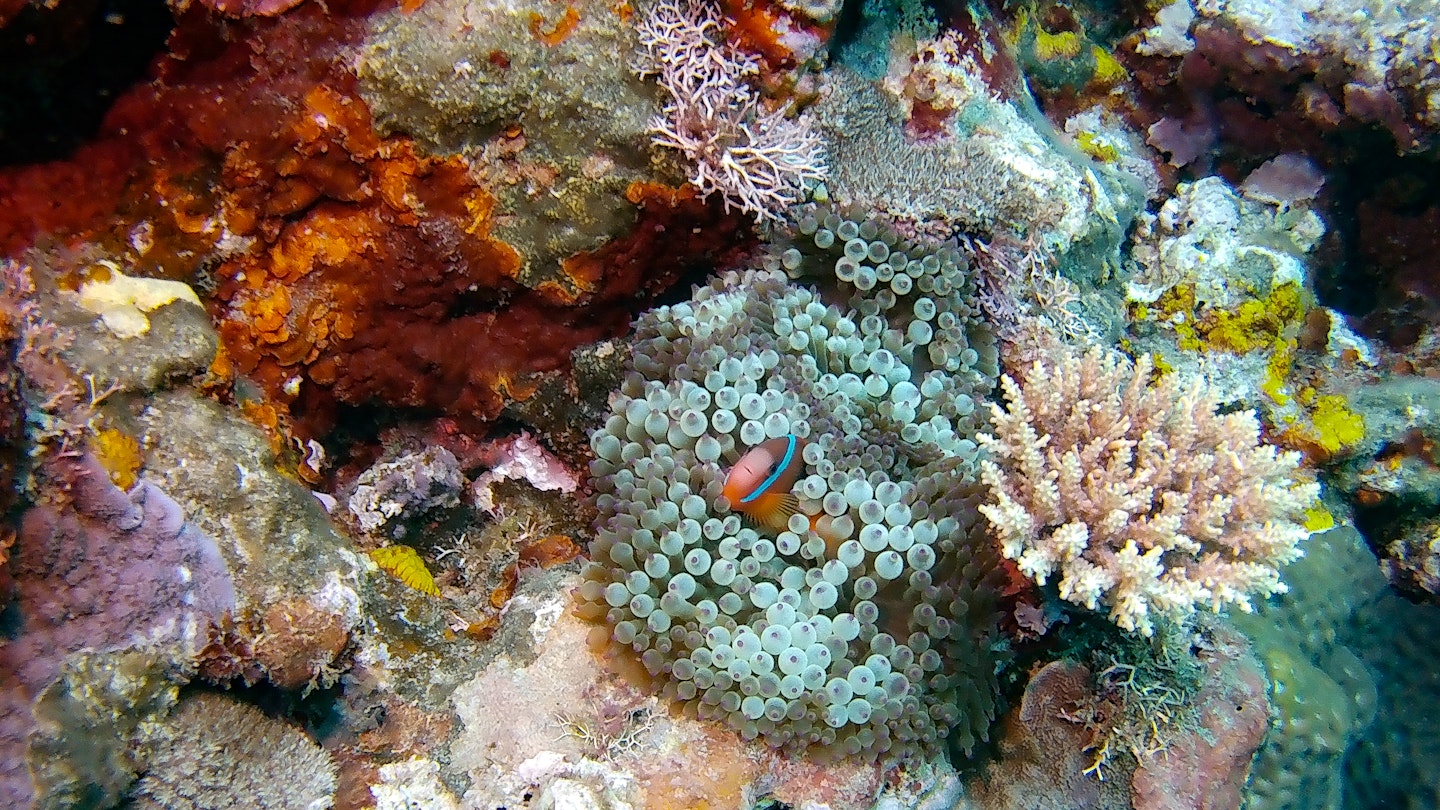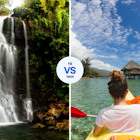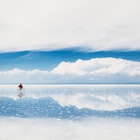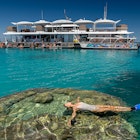
May 21, 2024 • 5 min read

Vanuatu is a scuba diver's dream – come see what all the fuss is about. Sarah Reid
Due for a diving holiday? Clear tropical waters, colorful coral reefs and a plethora of wrecks combine to make Vanuatu one of the best scuba diving destinations in the South Pacific. But there are also plenty of opportunities for snorkeling across the 80-plus island archipelago, also known for its wild landscapes and rich kastom (traditional) culture. From top dive sites to the best places to get certified, here’s a quick guide to exploring Vanuatu’s underwater world.
Vanuatu is one of the best countries to visit next year. See our full list of Best in Travel 2025 winners.
Diving in Vanuatu is predominantly resort-based, with the industry concentrated on three main islands: Efate, home to the capital Port Vila and Vanuatu’s main international airport; Espiritu Santo (just Santo to locals), which welcomed direct flights from Brisbane, Australia, in 2024; and the more remote and less developed island of Tanna, a 40-minute flight from Port Vila.
Most divers will have heard of the immense wreck of the SS President Coolidge in Santo, but there are plenty of other wrecks, reefs and caverns to explore across Vanuatu’s diving hubs.

Originally a luxury ocean liner launched in 1931 that went into service as a troop carrier during WWII, ‘The Coolidge’ was accidentally sunk in 1942 by US mines just off Luganville, the largest town on Santo. Almost 200m (656ft) long and 25m (82ft) wide, the coral-encrusted ship is now a popular shore dive with around 50 sites to explore, depending on your certification level.
Resting on its port side at a depth of between 21m (69ft) and 70m (230ft), The Coolidge is best suited to advanced divers, though open water divers can still enjoy a fun dive along the starboard hull towards the bow, where some artifacts from deeper in the ship have been stored for recreational divers to see. Advanced divers can ogle jeeps in the cavernous Cargo Hold 2, while certified technical divers can dive into the ship’s sunken swimming pool at 57m (187ft).
Another popular dive near Luganville is Million Dollar Point, a dumping ground for thousands of tons of US construction equipment during WWII. There are also a trio of plane wrecks off Santo that includes a rare birdcage Corsair fighter, while Tutuba Point off the north coast is known for its rich corals and swim-throughs. Just south of Luganville, Aore Wall is adorned with sea fans, while Cindy’s Reef offers a relaxed drift dive teeming with anemone fish.
Divers can explore more than 20 dive sites off the coast of Efate. More popular dives close to the capital city of Port Vila include the Twin Bommies, which attract an array of fish and critters; the Cathedral, a spectacular limestone chimney; and Ollie’s Lolly, a shallow reef near Hideaway Island with a rare red anemone. Beginner-friendly wreck dives include the Bonzer, a small tugboat with a vast anemone garden, while more experienced divers can explore wrecks like the Star of Russia, a 90m (255ft) three-masted ship built in the same Belfast shipyard as the Titanic.
Just off Efate’s northwest coast, Tranquility Island is another popular diving location. The top draw here is Owen’s Reef with its colorful soft corals and fans, giant brain corals and fields of staghorn corals.

With just one dive center on the island (Volcano Island Divers at White Grass Ocean Resort and Spa) Tanna’s 10 dive sites are blissfully uncrowded. The resort is just a few minutes’ walk from Tanna’s showpiece dive sites: Blue Hole One and Blue Hole Two. These sites aren’t classic limestone sinkholes like Belize’s iconic Great Blue Hole, but rather azure openings in the shallow fringing reef that have created natural aquariums. Accessible from the shore, both sites feature a network of interconnected grottos, caves, caverns and swim-throughs that connect to the outer reef wall.
Another popular site is the Blue Cave Aquarium, a magnificent amphitheater that can only be accessed underwater. More experienced divers can spot pelagics including barracuda, yellowfin tuna and reef sharks at Kamitua Reef.
Vanuatu’s reefs showcase a variety of hard and soft corals that attract an array of tropical fish (batfish, damselfish, angelfish, triggerfish, parrotfish and anemonefish are just some of the locals) and critters including nudibranchs, flatworms, giant moray eels and crustaceans like anemone shrimps and lobsters. Turtles, rays and reef sharks are frequent visitors, and lucky divers may even encounter a dugong. Anemone gardens abound on shallow reefs.
While most of Vanuatu’s reefs are in decent condition, ongoing threats of climate-related coral bleaching, storm damage, crown-of-thorns starfish and overfishing can impact the quality of coral and diversity of marine life you may see.
Dive courses are available on all three islands, but the calm and shallow bays of Efate are particularly ideal for learning. With its own dive center and a range of dive sites on its doorstep, Hideaway Island Resort (just a four-minute ferry ride from mainland Efate) is a popular choice. In downtown Port Vila, Big Blue Vanuatu is a convenient option for travelers staying locally.
On Santo, Pacific Dive also offers technical courses for divers interested in learning how to dive deeper than the recreational limit of 40m (131ft) – perfect for exploring the depths of The Coolidge.

Diving is a year-round activity in Vanuatu, though many divers opt to avoid the peak of the rainy season from December to March. While light rain doesn’t tend to affect underwater visibility in Vanuatu, bigger storms can make diving unsafe.
Many of Vanuatu’s dive sites can also be enjoyed by snorkelers. Some of the best snorkeling on Efate is on Tranquility Island’s house reef, known for its turtles; and in Hideaway Bay’s marine park, where you can "send" a waterproof postcard from an underwater post office located in a shallow coral garden. On Tanna, confident snorkelers can take a short freedive into the Blue Cave Aquarium at low tide, while the main pools of Blue Hole 1 and Blue Hole 2 can be accessed by snorkelers from the shore.
While the Coolidge is too deep for snorkeling, it’s possible to snorkel at Cindy’s Reef as well as shallow areas of Million Dollar Point. For a chance to snorkel with a dugong (or five), book a snorkeling tour to neighboring Aese Island with Santo-based snorkeling operator Best Snorkeling in Santo Vanuatu. Vanuatu’s remote Maskelyne Islands are another popular spot to snorkel with dugongs.
Most dive centers offer rental gear, but as quality can vary, some divers prefer to bring their own mask and dive computer (which aren’t always available to rent). Rental snorkel gear offered by hotels and snorkel tour operators can be low quality, making it a good idea to bring your own.
Vanuatu dive operators are required to be licensed, but safety standards can vary between dive centers and dive guides. With the only hyperbaric chamber in Vanuatu located in Port Vila, and more serious injuries and medical conditions requiring medical evacuation to Australia, New Zealand or New Caledonia, diving insurance with adequate evacuation cover is strongly recommended.


May 21, 2024 • 5 min read



Mar 10, 2022 • 7 min read



Dec 10, 2021 • 6 min read

